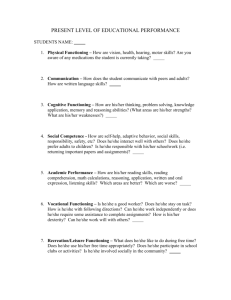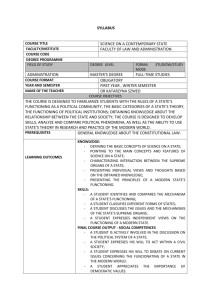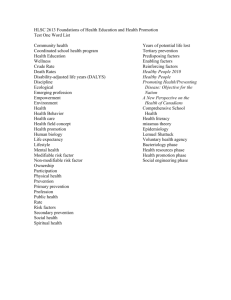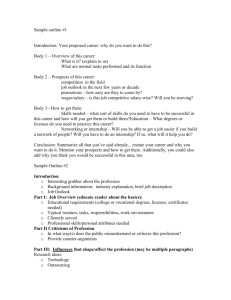Abstract
advertisement
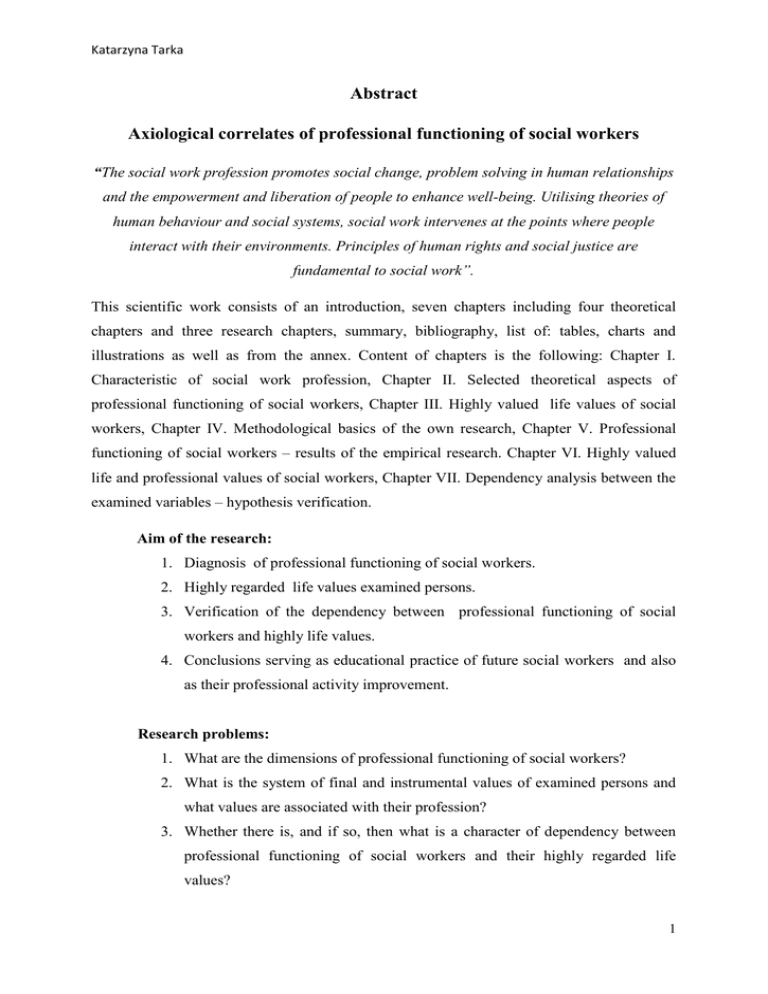
Katarzyna Tarka Abstract Axiological correlates of professional functioning of social workers “The social work profession promotes social change, problem solving in human relationships and the empowerment and liberation of people to enhance well-being. Utilising theories of human behaviour and social systems, social work intervenes at the points where people interact with their environments. Principles of human rights and social justice are fundamental to social work”. This scientific work consists of an introduction, seven chapters including four theoretical chapters and three research chapters, summary, bibliography, list of: tables, charts and illustrations as well as from the annex. Content of chapters is the following: Chapter I. Characteristic of social work profession, Chapter II. Selected theoretical aspects of professional functioning of social workers, Chapter III. Highly valued life values of social workers, Chapter IV. Methodological basics of the own research, Chapter V. Professional functioning of social workers – results of the empirical research. Chapter VI. Highly valued life and professional values of social workers, Chapter VII. Dependency analysis between the examined variables – hypothesis verification. Aim of the research: 1. Diagnosis of professional functioning of social workers. 2. Highly regarded life values examined persons. 3. Verification of the dependency between professional functioning of social workers and highly life values. 4. Conclusions serving as educational practice of future social workers and also as their professional activity improvement. Research problems: 1. What are the dimensions of professional functioning of social workers? 2. What is the system of final and instrumental values of examined persons and what values are associated with their profession? 3. Whether there is, and if so, then what is a character of dependency between professional functioning of social workers and their highly regarded life values? 1 Katarzyna Tarka Problems in details: With reference to the first question: 1. How do social workers evaluate their professional roles? 2. What attitudes towards their profession do examined persons display? 3. What is their sense of professional responsibility? 4. How do social workers deal with professional problems? 5. Whether, and if so to what extent, do examined persons feel professional/ occupational/job burnout ? With reference to the second question: 1. What is the system of final values of research social workers? 2. What is the system of instrumental values of examined persons? 3. What kinds of values connected to executed job are appreciated by social workers? With reference to the third question: 1. What is the dependence between professional functioning of social workers and their system of final values? 2. What are the dependency between professional functioning of social workers and their system of instrumental values? 3. What is the connection between professional functioning of social workers and the values related to the executed job? Method of diagnostics’ survey Research technics: 1. Square Test 2. t° - Student Test 3. Mean 4. Percentage 5. r-Pearson correlation 6. Spearman rank correlation 7. One – factor Variation Analysis 2 Katarzyna Tarka 8. Discriminatory Analysis Tools: 1. The Authorial Questionnaire for Social Workers. 2. The Professional Behaviour Rate Questionnaire, (WPZ) I. Koneckiej. 3. R. Bera Questionnaire for Research of Professional Responsibility Feelings. 4. The Work Subjective Values Questionnaire, B. Dudek and others (2004) (SOP). 5. The Questionnaire to Manage in Stressful Situations, J. Strelaua and others (2005) (CISS). 6. The Scale of Professional Feelings (MBI), Ch. Maslach. 7. M. Rokeach Values Scale, (RVS) (1973). 8. Values Related to the Work Scale, B. Bromberk (SWZzP) (1988). Results of the Research: 1. Professional roles 1) Motivation of the profession choice: a) the own qualifications – 51,9% b) character of work – 36,1% c) case – 35,5% 2) Professional role aspects: a) lead work possibility of other people – 70,0% b) prestige – 50,0% c) creative and progress work – 40,0% 2. Attitudes toward the executed profession Indicators of profession attitudes (M - mean): a) progress possibility – 4,04 b) work atmosphere – 3,94 c) appropriate jobs – 3,61 3. Profession responsibility feeling Decisive characteristics about profession responsibility: a) words keeping – 98,0% 3 Katarzyna Tarka b) honesty and honour – 97,4% c) law rules respect – 96,8% 4. Stress management Styles management with problems: a) style concentrated on a task – average b) style concentrated on emotions – low c) style concentrated on an avoidance – average 5. Job Burnout 1) General result (score): a) low – 30,2% b) average – 33,3% c) high – 36,5% 2) Job bornout components: a) emotional exhaustion level – average b) depersonalise level – low c) reduced feeling level of personal accomplishments – high 6. The Final values hierarchy (M - mean) a) family security – 4,42 b) national security – 4,51 c) the world peace – 5,27 7. The Instrumental values hierarchy (M - mean) a) responsible – 4,50 b) independent – 5,09 c) helpful – 6,58 8. Professional values related to the executed job (M - mean) a) values concerning social orientation – 4,06 b) values concerning internal orientation – 3,73 c) values concerning personal convenience – 3,21 d) values concerning prestigious orientation – 2,77 4
